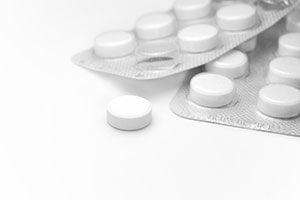Lithium Toxicity Medication Error Lawsuit
 Lithium is a well-recognized toxic therapy for depression and bipolar disorder. It is an effective drug for some patients when prescribed properly. It is important to check the patient's blood lithium levels and check kidney function about every three months.
Lithium is a well-recognized toxic therapy for depression and bipolar disorder. It is an effective drug for some patients when prescribed properly. It is important to check the patient's blood lithium levels and check kidney function about every three months.
Lithium toxicity typically occurs when the patient takes took much lithium. But it can also be caused by mixing drugs that dehydrate the patient. Dehydration can worsen Lithium toxicity.
Many lithium toxicity cases are failure to monitor the patient or to see the signs and symptoms of this condition.
This Complaint in this case presents a little different story. In his malpractice case, the defendant is a primary care doctor who mixed lithium with a blood pressure medicine that is known to cause dehydration.
Franklin v. GBMC HealthcareThis medical malpractice claim was filed in Baltimore County after a woman was prescribed contraindicated medications. It was filed in Health Claims Arbitration on March 29, 2018, and it is the 152nd medical malpractice case filed in Maryland this year. (We could not find any evidence this case was ever filed in Circuit Court as of November 2019.)
Summary of Plaintiff's AllegationsA woman's primary care provider wrote prescriptions for her various medical conditions, including a prescription for lithium. When the woman requested a refill of her prescribed medications, the physician issued an order for her to receive a prescription of hydrochlorothiazide (HCTZ) tablets from the pharmacy, in addition to refills of her other medications.
HCTZ is a blood pressure medication contraindicated in patients on lithium. It can decrease the kidneys' ability to process lithium, so patients taking both HCTZ and lithium supplements are at risk for lithium toxicity.
Ten days after the woman received her updated prescriptions, she presented to St. Joseph Medical Center with complaints of severe nausea and vomiting. She was admitted with a diagnosis of lithium toxicity and HCTZ-induced pancreatitis. In the weeks that followed, the woman continued to suffer the effects of lithium toxicity, including pancreatitis, gout, acute kidney injury, gallbladder stones, and dehydration.
Additional Comments- Lithium is a soft, silvery-white metal with the symbol "Li" on the periodic table. Lithium compounds are used as a psychiatric medication to treat the mania associated with bipolar disorder.
- Hydrochlorothiazide (HCTZ) manages high blood pressure by increasing the flow of urine in order to reduce the total amount of water in the body. Both HCTZ and lithium have a similar effect on the kidneys, so it can be extremely dangerous to take both medications at the same time.
- Pancreatitis is the medical term for inflammation in the pancreas, which can cause life-threatening complications such as infection, kidney failure, breathing problems, malnutrition, and cancer. The most conservative treatment options for chronic pancreatitis include pain management care, enzyme supplements, and dietary changes. More severe cases may require surgery.
- In most cases, acute lithium toxicity results from chronic accumulation of the drug, often in the setting of unrecognized diuretics (particularly of the thiazides like HCTZ), renal insufficiency, non-steroidal anti-inflammatory agents, and dehydration.
- Due the toxicity risks, lithium is classified as a "narrow therapeutic index" medication. This means that a fine line between the upside of the drug and toxicity. So adding new medications into the mix that upset the apple cart can result in significant and potentially life-threatening toxicity.
- I would be interested to know if the doctor prescribed hydrochlorothiazide (HCTZ) without first checking the patient's renal status
- Baltimore County
- An internist
- GBMC Healthcare, Inc.
- GBMC Physicians, LLC
- St. Joseph Medical Center
- Prescribing contraindicated medications known to cause serious toxicity when they interact.
- Failing to advise the claimant about the risks of HCTZ and to offer safer alternative medications. (Certainly, you want want the doctor to warn the patient about a drug interaction between Lithium and HCTZ.)
- Failing to closely monitor the claimant after the risky prescription of HCTZ.
- As a direct result of the defendants' negligence, the claimant suffered lithium toxicity, which caused kidney injury and HCTZ-induced pancreatitis.
- Informed Consent
Have you suffered a hospital injury due to the negligence of a doctor? Miller & Zois can help you. Call us at (800) 553-8082 and speak to one of our medical malpractice attorneys who can help you or get an online case review. More Malpractice Claim Information
- View sample medical malpractice verdicts and settlements from Baltimore County.
- Read about other types of medication error lawsuits.
 Miller & Zois, Attorneys at Law Home
Miller & Zois, Attorneys at Law Home











